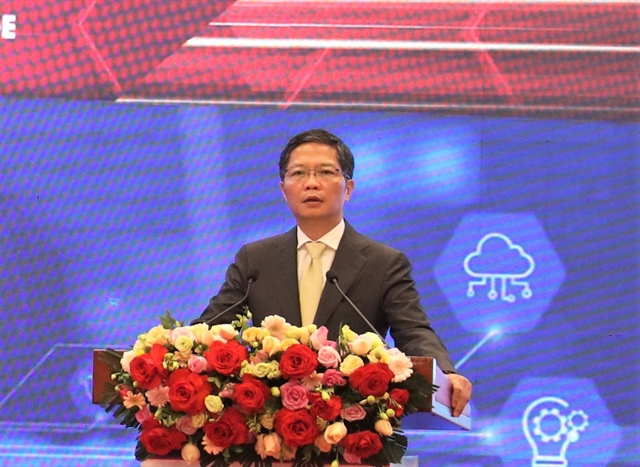
HÀ NỘI — Facing the upheavals of the fourth industrial revolution, Việt Nam needs innovation in technology and investment to ensure continued socio-economic development.
Experts discussed these issues, and economic recovery in a post-pandemic world, at the Industry 4.0 Summit, held on Monday in Hà Nội.
Technological limitations, overreliance on external factors, a lack of focus on supply chain and poor productivity were detrimental to Việt Nam's socio-economic development, said head of the Central Economic Committee Trần Tuấn Anh at the forum.
The Southeast Asian economy has made significant progress in recent decades by maintaining an average 6.6 per cent GDP growth in 2000-19. Việt Nam ranked 67 out of 142, moving up 10 places in 2018 and 2019 in the Global Competitiveness Index, while moving up 16 places from 58th to 42nd in the United Nations Industrial Development Organization's ranking in 2019.
The country has also been constantly making improvements in terms of its innovation capacity, ranking 44 out of 126 in the Global Innovation Index.
However, Anh, a former minister of industry and trade, said the country's development still lacked long-term objectives and sustainability and there is a need for a comprehensive strategy for the development of industries and rural areas.
He stressed the importance of technology, especially digital technology in the country's socio-economic development in the next ten years, saying the fourth industrial revolution is to fundamentally impact all industries, agricultural production and the service sector.
Addressing the event, Prime Minister Phạm Minh Chính said two months since Việt Nam implemented a number of policies and measures to speed up recovery in the new normal there have been positive signs that the economy is bouncing back strongly.
"The Vietnamese people are at the core of Việt Nam's socio-economic development strategy and objectives," said the PM.
He said the government has set a target to vaccinate 100 per cent of the country's adult population in December, start rolling the third booster shots and vaccinate children 12-18 years old.
In addition, measures are being taken to strengthen medical facilities' ability to receive and treat COVID-19 patients as well as to protect industrial zones and gradually open tourism and international trade.
Speaking at the event, Caitlin Wiesen, UNDP Resident Representative in Việt Nam, said the country must continue to nurture and support national export champions, and focus on public investment, especially strategic investment in transport, power, logistics, research, education and training can help domestic firms lower costs and achieve greater competitiveness.
She said successful industrialising countries have also used long-term finance as a tool to promote innovation and help companies achieve economies of scale. Finance will be crucial to the development of new industries and to achieve the commitments set out at COP26 to shift investment from extractive to carbon-neutral opportunities to accelerate climate resilience, biodiversity protection and sustainable development.
While Việt Nam is well placed to benefit from IR 4.0, the country must also be mindful of the risks of allowing the digital divide to widen. She pointed out that there was a large divide between access to the internet and access to local e-government portals for administrative services. Only 4.5 per cent of those who did their administrative services in 2020 used national and provincial e-service portals, although access to the internet improved in most of the provinces in 2020 compared to 2019.
"Our ongoing research on access to e-services in mountainous provinces where ethnic minority populations account for a large number, e-services are almost unused and access to the internet remains much poorer than in centrally-governed municipalities and lowland provinces. Therefore, advancing e-services while improving digital inclusion is an area that will require urgent attention for sustainable socio-economic rebound," Wiesen said.
In order to speed up economic recovery, the UNDP representative called on the government to accelerate electronic registration and payment for social assistance programmes to reduce administrative costs and cash transfer delivery times and to increase transparency, pointing out that the ability to register and make payments electronically, if it had been established prior to the pandemic, would have greatly improved the effectiveness of government assistance programs in 2020 and 2021 in reaching people in need.
During the conference, policymakers and experts are to discuss the following main topics: policy-making for Việt Nam's socio-economic recovery in the new normal, how to speed up the country's process of industrialisation and modernisation using science and technology and how to realise the objective of transforming Việt Nam into an advanced country and an economic hub of Asia by 2045. — VNS
Xem thêm: lmth.timmus-tnempoleved-cimonoce-oicos-lanoitan-ot-yek-ygolonhcet/4424901/ymonoce/nv.swenmanteiv